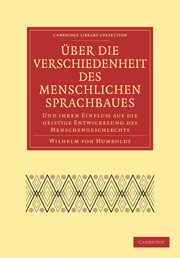Sections §20 - §25 pp. 190-414
Published online by Cambridge University Press: 04 April 2011
Summary
Mit dem grammatischeh Baue, wie wir ihn bisher im Ganzen und Grossen betrachtet haben, und der äusserlichen Structur der Sprache überhaupt ist jedoch ihr Wesen bei weitem nicht erschöpft, und ihr eigentlicher und wahrer Charakter beruht noch auf etwas viel Feinerem, tiefer Verborgenem und der Zergliederung weniger Zugänglichem. Immer aber bleibt jenes, vorzugsweise bis hierher betrachtete, die nothwendige, sichernde Grundlage, in welcher das Feinere und Edlere Wurzel fassen kann. Um dies deutlicher darzustellen, ist es nothwendig, einen Augenblick wieder auf den allgemeinen Entwicklungsgang der Sprachen zurückzublicken. In der Periode der Formenbildung sind die Nationen mehr mit der Sprache, als mit dem Zwecke derselben, mit dem, was sie bezeichnen sollen, beschäftigt. Sie ringen mit dem Gedankenausdruck, und dieser Drang, verbunden mit der begeisternden Anregung des Gelungenen, bewirkt und erhält ihre schöpferische Kraft. Die Sprache entsteht, wenn man sich ein Gleichniss erlauben darf, wie in der physischen Natur ein Krystall an den andren anschiesst. Die Bildung geschieht allmälig, aber nach einem Gesetz. Diese anfanglich stärker vorherrschende Richtung auf die Sprache, als auf die lebendige Erzeugung des Geistes, liegt in der Natur der Sache; sie zeigt sich aber auch an den Sprachen selbst, die, je ursprünglicher sie sind, desto reichere Formenfülle besitzen.
- Type
- Chapter
- Information
- Über die Verschiedenheit des menschlichen Sprachbaues und ihren Einflu§ auf die geistige Entwickelung des Menschengeschlechts , pp. 190 - 414Publisher: Cambridge University PressPrint publication year: 2009First published in: 1836

